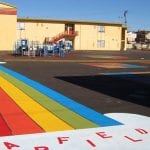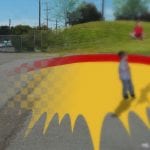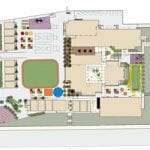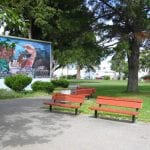Oakland, California
Challenge
Residents of Oakland’s Eastlake, Lower San Antonio, and Fruitvale neighborhoods suffer disproportionately from illnesses such as heart disease, hypertension, and asthma. A range of factors contribute to the prevalence of these illnesses in what are predominantly immigrant communities, including sedentary lifestyles, a lack of safe and inviting parks, and an absence of programs that encourage exercise. Consequently, improving the parks and schoolyards in these neighborhoods is not just a matter of providing attractive outdoor spaces, it’s a matter of health.
Plan
Working with parents, young people, community organizations, educators, and city officials in workshops, focus groups, and one-on-one meetings, Urban Ecology is developing a vision for physical and programmatic change at three underutilized parks and schoolyards that serve those communities.
Implementation
Garfield Elementary School
In partnership with the East Bay Asian Youth Center (EBAYC), Urban Ecology has just completed a master plan for improving the schoolyard at Garfield Elementary in Lower San Antonio.
As a part of EBAYC’s Parent Action Committee meetings, parent leaders and Urban Ecology staff planned a series of three workshops to involve parents in envisioning improvements for the schoolyard. EBAYC parent leaders and organizers were responsible for the outreach to parents to ensure high attendance, while Urban Ecology staff organized the content of the workshops. In total about 150 parents attended the three workshops. At every workshop, EBAYC staff translated from English to four different languages – Spanish, Vietnamese, Cantonese and Khmer.
Based on what we learned from the parents, students and teachers, Urban Ecology developed a Schoolyard Master Plan for Garfield. The plan keeps safety and security as its primary focus, provides new recreation activities as well as space for outdoor classrooms, and improves the schoolyard’s image and attractiveness. Currently, Urban Ecology is working with EBAYC and the Oakland Unified School District to implement the plan through a blend of community participation and public and private funding. For example, EBAYC, Urban Ecology, and Garfield School have already received a $5,000 mini grant to create a garden on the school grounds. Teachers and parent leaders are working together to plan and construct the garden.
Roosevelt Middle School
This fall, Urban Ecology will build upon the knowledge and relationships developed through the Garfield Elementary Schoolyard planning process by working with the EBAYC on a schoolyard master plan for Roosevelt Middle School in the same neighborhood.
Urban Promise Academy
Also this fall, Urban Ecology will be partnering with the Unity Council in the Fruitvale District to develop a schoolyard improvement plan for the Urban Promise Academy. Urban Ecology will involve the Student Leadership Team, the parents on the School Site Council, teachers, the principal, the school district, and other community members in the design and planning process.
Healthy Food Access
In the summer of 2005, Urban Ecology worked with over a dozen Lower San Antonio youth to evaluate the barriers to healthy food and adequate physical activity in the neighborhood. As part of the California Endowment’s four-year, $26 million statewide Healthy Eating, Active Communities initiative, this internship program produced crucial data for Oakland’s efforts to combat childhood obesity and advocate for healthy lifestyles, and garnered the attention of Maria Shriver, California’s First Lady, who paid a visit to EBAYC and the San Antonio neighborhood as part of her statewide tour to promote healthy nutrition.
Groundwork Trust Feasibility Study
In the Spring of 2006, and with support from the National Parks Service – Groundwork USA Initiative, Urban Ecology undertook a study to determine the feasibility of establishing a permanent Groundwork Trust in Oakland. Groundwork Trusts are independent, nonprofit environmental organizations that undertake cooperative projects to promote the environmental, economic, and social well-being of their communities using staff, volunteers, and leveraged funding resources from both public and private sources.
After extensive research and analysis with members of the Groundwork Trust Oakland Steering Committee, it was determined that despite the benefit and need for a Groundwork Trust, there was not a sufficient commitment to form an active board at this time. Committee members hope that the programs and projects identified in the study will be implemented by existing community organizations in Oakland.
To find out more or read the full report, please go to the City of Oakland – Public Works.






